Books
Books
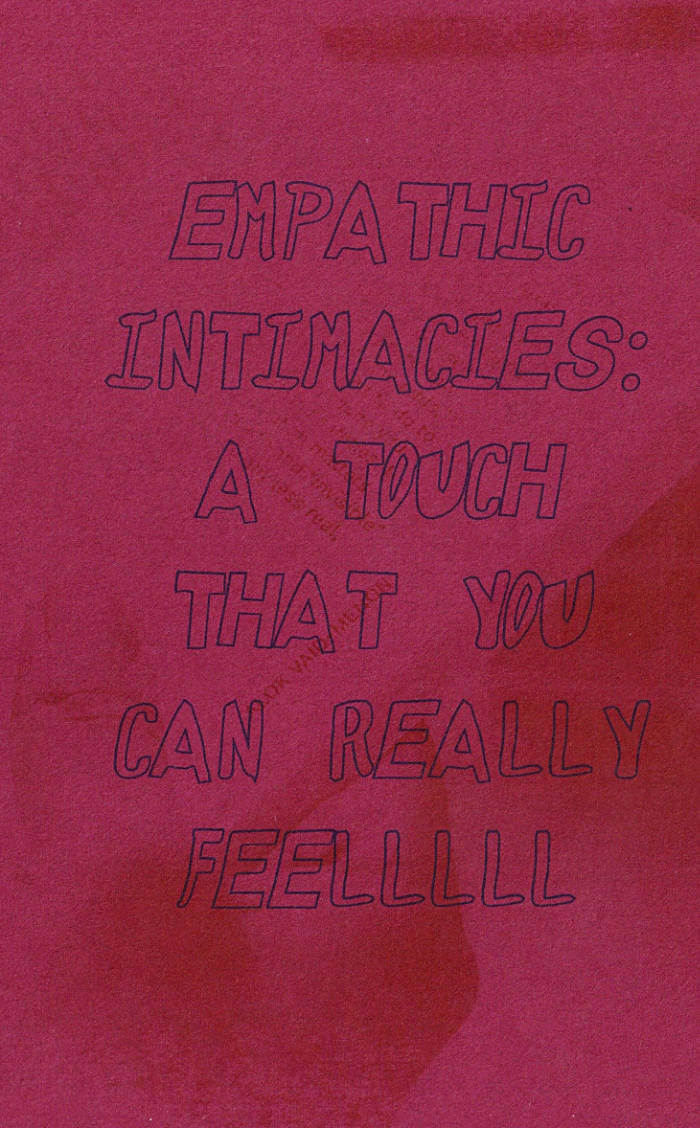
Empathic Intimacies: A Touch That You Can Really Feellllll
Empathic Intimacies: A Touch That You Can Really Feellllll is two essays written 2 years apart (April 2020 and April 2022), published together to create a timeline between two points during the pandemic.
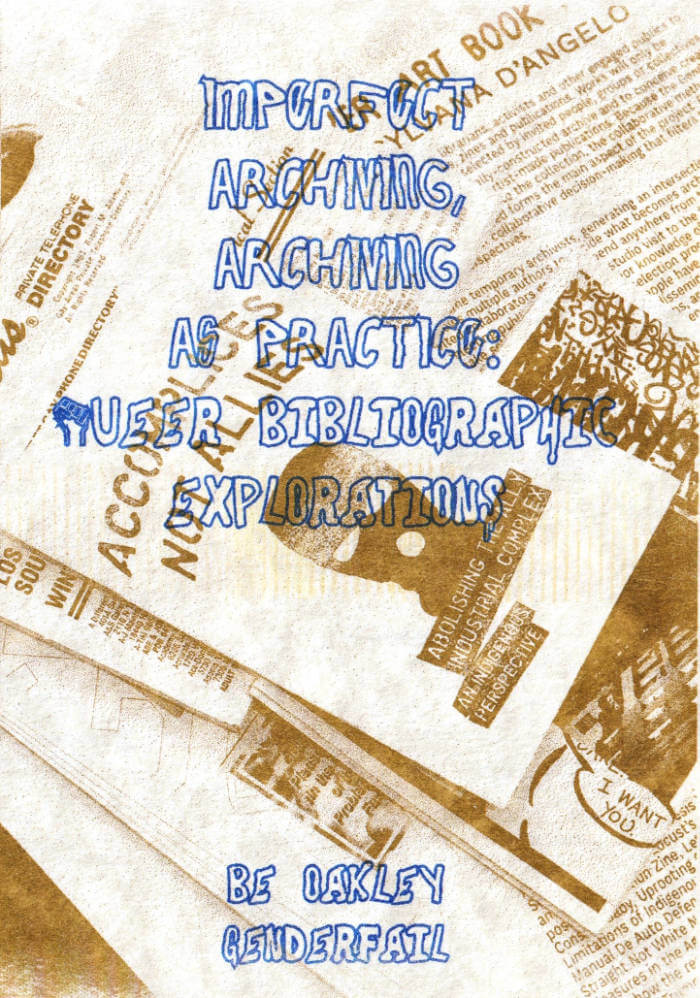
Imperfect Archiving, Archiving as Practice: Queer Bibliographic Explorations
Imperfect Archiving, Archiving as Practice: Queer Bibliographic Explorations is a special expanded 5th edition centering on archiving as artistic practice. This manifesto talks to the core of GenderFail collecting and archiving practices that look to the softness as a metaphor for the material and content of artist-made publications. The GenderFail Archive Project is a socially engaged reading room that looks at archiving as practice. The project stems from GenderFail’s desire to share the publications from their personal library archive and give a platform to other publishers that they cherish. This publication features and highlights over a hundred artist books, art books, and zines.
This edition features a new section previously unpublished, showing bibliographies created for exhibitions and programs with the GenderFail Archive project at spaces such as Wendy's Subway, The Studio Museum of Harlem, and Cleveland Institute of Art's Reinberger Gallery.
This publication also features the 4th edition featured section showing seven curated GenderFail Archive Project reading lists from “Publishing Now,” a class I taught from 2021-2023 at the School of the Museum of Fine Arts at Tufts University. For this course, I wanted the students to read zines and publications being produced in real-time, so I started to digitize my collection as I acquired specific titles that I felt the students would resonate with. Many of the readings for this course were scanned from my collection of over 2,000 zines, artist books, and art books that make up the GenderFail archive. Since we could not meet in person (due to the pandemic), I spent hours scanning zines and artist books to be used as required readings for the course. Each reading list will accompany a link and QR code to read and engage with the complete scanned copies of all 31 featured artist books, art books, and zines.
The Imperfect Archiving, Archiving as Practice: Queer Bibliographic Explorations, is among my most cherished project I’ve published of the over 125 editions I’ve designed and printed with GenderFail.
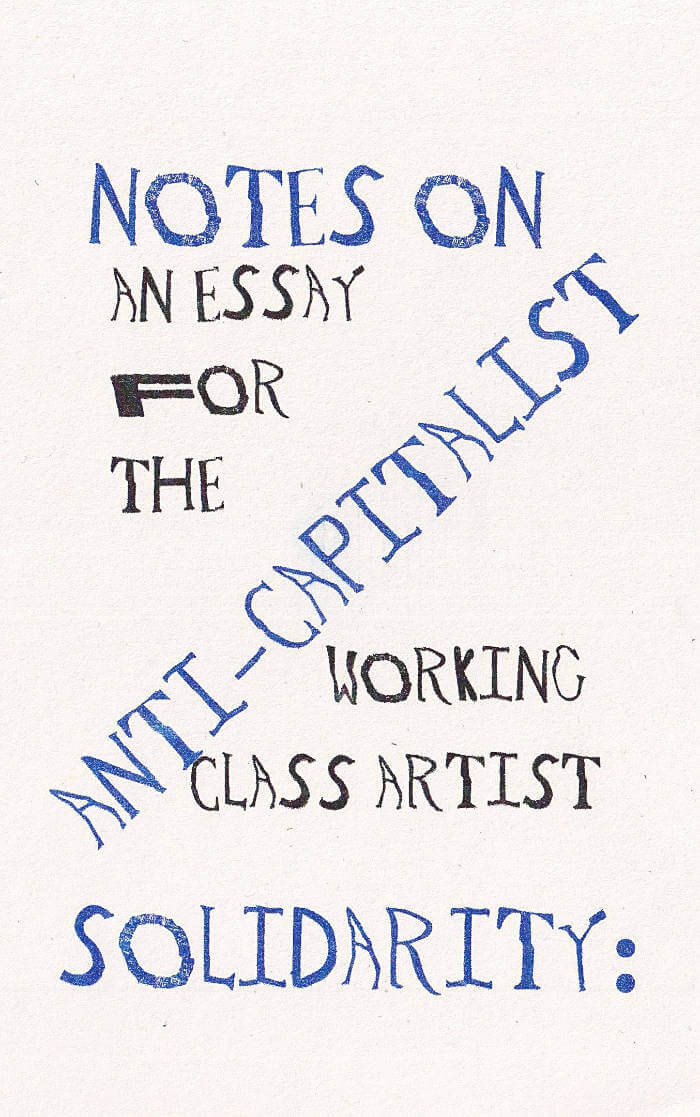
Notes on Anti-capitalist Solidarity: An Essay for the Working Class Artist
Notes on Anti-capitalist Solidarity: An Essay for the Working Class Artist was first commissioned by former Artspeak Director/Curator Bopha Chhay and published as part of their BEACON series.
In the essay, Oakley states:
Why do so many artists, designers, and low-wage workers still embrace this system of exploitation without question? Are we so compromised by the false promise of success that we have become numb to the exploitation we endure for the chance of being in a place to exploit others ourselves? Do we want to be in this position? And if not, what can we do to change this?
BEACON is a series that examines how artists’ commitment to wider social movements informs contemporary artistic practice. It will feature texts by artists whose practices engage with language and visual arts. Former Artspeak Director/Curator Bopha Chhay edited the series.

Christ’s Cunt
Christ’s Cunt is a book of poems that has nothing to do with the Christian God. It has everything to do with the pure insanity of the Christ figure, the hedonism of Christ, and the bloody images and symbols of “His” birth. Washing the feet of the Whore; turning the other cheek; starvation, body mutilation, transformation, wine, miracles, orifices, bleeding. It’s pure rave. This is the first era in history in which we can do medical procedures to change a person’s gender. How monumental that is in human civilization, how monstrous, how absurd this would appear for people in the past. For me, to get a cunt is as monumental an act in the course of history as when Christ first let “him” self be nailed to a phallic plank. I love it.

Vulnerability: or, Why I Show My Tits & Cock & Balls In My Performances
Vulnerability: or Why I show my T*ts & c*ck & b*ll’s in my Performances is a new essay by Yvonne LeBien. This essay speaks to the agency of the trans body in public through LeBien’s years of performing naked in the world as a trans woman. In this time of nightmarish evangelical transphobia, Yvonne’s unapologetic rawness is urgent.
This 60-page, 5x4.5, 5x4.5-inch book is as small as it is crucial in the discourse of trans excellence in a climate of fear by the ignorant.

Textdemic: A Retrospective on Jenny Holzer’s Laments
Textdemic | A Retrospective on Jenny Holzer’s Laments” Ed. by A.L. Steiner and GenderFail, a publication based on A.L. Steiner + Friends on Jenny Holzer at Dia Chelsea. This book is based on the Artists on Artists Lecture Series when the Dia Art Foundation invited Steiner to curate a public program based on a work of the artist's choice.
Steiner chose Jenny Holzer’s Laments and invited Morgan Bassichis, Riel Bellow, Gregg Bordowitz, Alexander Chee, Malik Gaines, Guadalupe Maravilla + Alexa Mishell Guillen, Lucas Michael, Eileen Myles and Pamela Sneed to present in Dia’s first in-person program after the Covid-19 pandemic began in 2021. This publication features records of the poems, lectures, and performances during this memorial program. The book's design plays homage to the 1990 Laments publication by the Dia Art Foundation.
For this publication, Steiner and GenderFail invited Matilde Guidelli-Guidi, Associate Curator at Dia Art Foundation and the organizer of the Artists on Artists Lecture Series, to write an afterword for the book. In this, she states: "Dispensing altogether with the monographic formula that characterizes the institution, for her Lecture A.L. Steiner convened a group of artists, writers, and activists to join her in responding to Jenny Holzer’s 1989 text-based installation, Laments. Holzer identified the thirteen texts that comprise Laments as 'voices of the dead,' a visual choir in response to the raging HIV/AIDS epidemic and government inaction. Over the protracted COVID-19 lockdown, Steiner developed the idea to organize an evening for the voices of the living to lament today's crises.”
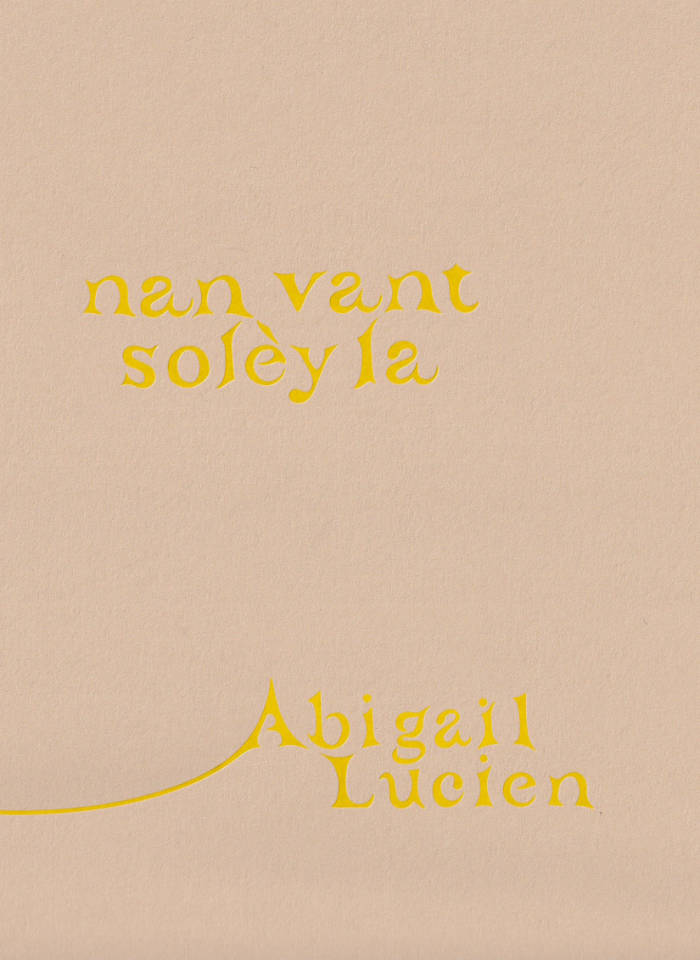
Nan Vant solèy la
Through creative nonfiction, poetry, and the printed image, the publication considers the playful and purposeful self-actualization of a bicultural queer identity while navigating grief as a landscape to address themes of (be)longing, futurity, and place. Alongside a collection of their works and research, Abigail Lucien weaves written and visual offerings by fellow Caribbean and queer artists, including works by Lukaza Branfman-Verissimo, Justin Chance, Cielo Felix-Hernandez, Sucking Salt, and Tamara Santibañez, to create an expanded context for their work rooted in friendship and radical love.
Abigail Lucien (b.1992) is a Haitian-American interdisciplinary artist, educator, auntie, lover, and friend. Working in sculpture, literature, and time-based media, Lucien’s practice addresses themes of (be)longing, futurity, myth, and place by considering our relationship to inherited colonial structures and systems of belief/care. Past exhibitions include SculptureCenter (NY), MoMA PS1 (NY), Deli Gallery (NY), MAC Panamá (Panamá), Frost Art Museum (Miami, FL), Atlanta Contemporary (Atlanta, GA), UICA (Grand Rapids, MI), and The Fabric Workshop and Museum (Philadelphia, PA). Residencies include Amant Studio & Research Residency (NY), Skowhegan School of Painting & Sculpture (Madison, ME), the Eugeniusz Geppert Academy of Fine Arts (Wrocław, Poland), The Luminary (St. Louis, MO), Santa Fe Art Institute (Santa Fe, NM), ACRE (Steuben, WI), and Ox-Bow School of Art & Artist Residency (Saugatuck, MI).
Lucien has taught as a full-time faculty member and professor in the Department of Sculpture & Extended Media at Virginia Commonwealth University and the Interdisciplinary Sculpture Department at the Maryland Institute College of Art. In the fall of 2023, they will join the Department of Art and Art History as an Assistant Professor of Sculpture at Hunter College in NYC. Deli Gallery represents Abigail Lucien.
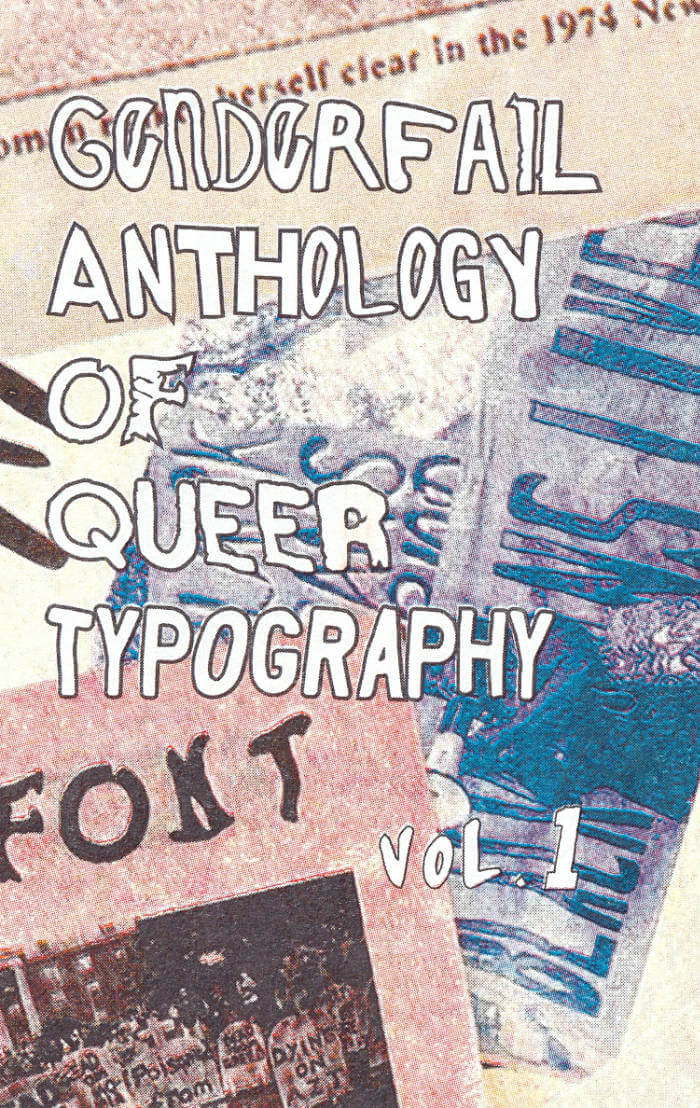
GenderFail Anthology of Queer Typography Vol.1
GenderFail Anthology of Queer Typography Vol.1 is the first volume in a series of publications, workshops, and programs exploring queer and trans exploration and experiments in typography. This first volume focuses on GenderFail's ongoing typographic series of fonts created from the hand letters of protest signs from historical and contemporary acts of resistance centering the voices of queer, trans, black, and other marginalized voices.
This first volume also features a reprinting of Paul Soulellis's What is Queer Typography? that acts as both the forward to this anthology and the series in general. Soulellis first printed this text as a fundraiser for Queer.Archive.Work to help raise urgent funds for the organization. GenderFail is humbled to be able to reprint this work and have it included as a seminal text in this anthology series exploring non-dominant modes of typographic exploration.
This third edition features a four-color risograph printed cover and new sections showing open-source examples of the fonts.

New York Temps
Composé à la fois de récits personnels, de citations et de collages provenant notamment du New York Times, New York Temps suggère une discontinuité des états intérieurs, accentuée par la multiplicité des orateur.ices : les voix se succèdent à elles-mêmes, sont à chaque moment ce qu’elles n’étaient pas celui d’avant, apprenantes et à l’écoute de tout ce qui n’est pas elles. À travers des questions d’intertextualité et de sampling en poésie, le texte porte en lui une violence immanente – rendue plus intérieure, faite sienne –, une gêne, non seulement ressentie, mais aussi imposée, comme une protestation.
Titre original : NYT. Publié pour la première fois chez Gauss PDF en 2018. Traduit de l’anglais par Salomé Burstein.
Aurelia Guo est écrivaine et chercheuse à Londres. Elle est également l’autrice de World of Interiors (Divided Publishing, 2022).

Secrèt
Mystique des rues vides et peu éclatantes des banlieues pavillonnaires, ce court poème en prose interpelle par sa langue sombre. Dans une parodie de messe noire – beigeasse comme le crépis des façades –, Théo Robine-Langlois dépeint le monde mystérieux des maisons individuelles, du repli sur soi démonique, et des vieilles qui marmonnent entre leurs gencives au retour du marché, le panier plein de gros sel et de radis noirs en guise d'hostie. Les mots occitans qui ponctuent le texte comme des conjurations en accroissent l’escur.

Oraison funèbre pour Zelda1990
D’eux, il ne reste que les mots de celle qui a croisé leur route. Le crissement de pneus qui sifflent avant un malheur qui tarde à se produire. Sanctification plus que célébration, Oraison funèbre pour Zelda1990 est une tentative de communication au-delà de la matière physique de l’énonciation, un dialogue interne qui convoque « par moment le frère, par moment l’ami parti », toujours la ruine, la consommation de la séparation avec le tout. À travers quatre parties qui font écho à la structure des éloges funèbres de la Grèce antique, Romane Constant réouvre la poésie des plaies larges et profondes que les vers lapidaires d’Hélène Bessette – sur qui l’autrice mène un travail de recherche – ont laissé dans l’histoire moderne de la littérature, et signe un texte bouleversant sur la difficulté des choses qui ne (se) passent pas, la force de celles que l’on voit suspendues par le cou au bord d’une paix impossible à trouver. Oraison funèbre pour Zelda1990 est une douleur croissante, avec écoulement et rougeur.
Romane Constant vit et travaille à Paris. Elle explore à travers différents supports les questions relationnelles, d’intimité, du corps et du genre. Attachée aux Ardennes où elle a grandi, elle s’intéresse également à l’héritage de la classe ouvrière et aux traumatismes intergénérationnels.
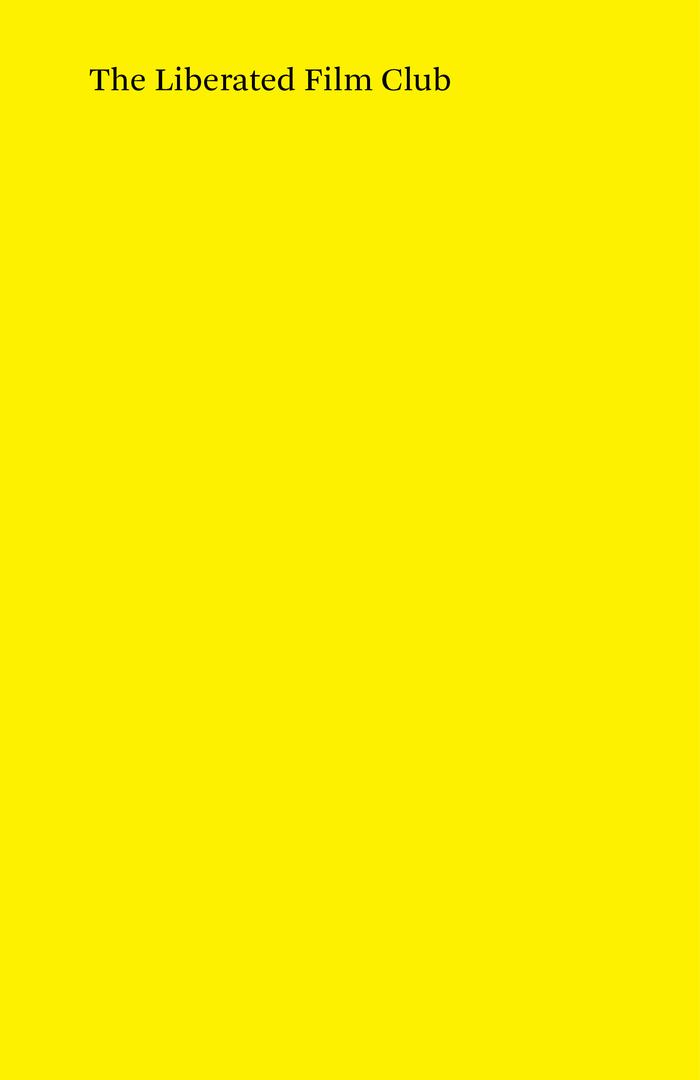
The Liberated Film Club
The Liberated Film Club—running from its birth to its death, 2016 to 2020—would guarantee a wide wing-span for critical conversation. Screening “Liberated film” (a loose category designed to scaffold the show), a guest would be invited to introduce a film; an audience seated to watch it through; but there’d be an interruption to that typical format. Neither the audience nor the guest would have any idea what film would be shown, and this anonymised format would invite broad and antagonistic perambulation on the what, the why and the how of film.
An interrogation of what we do when we sit in a cinema; a reckoning with the kind of posture we should assume when we frame a film for further talk. Playing with the various ways we should consider and reproach the institutions built around all of our cultures of making and the manners and methods of all of our cultures of consumption, the Liberated Film Club was a rare reflection on the act of reflection itself.
An anthology publication,
featuring contributions from
John Akomfrah;
Chloe Aridjis;
Dennis Cooper;
Laura Mulvey;
Chris Petit;
Mania Akbari;
Elena Gorfinkel;
Juliet Jacques;
Ben Rivers;
Dan Fox;
Sean Price Williams;
Adam Christensen;
Stewart Home;
Stephen Watts;
Tony Grisoni;
Gideon Koppel;
Astra Taylor;
Miranda Pennell;
Gareth Evans;
Adam Roberts;
Tai Shani;
Anna Thew;
Xiaolu Guo;
Andrea Luka Zimmerman;
William Fowler;
Athina Tsangari;
John Rogers;
Shama Khanna;
Shezad Dawood;
Damien Sanville;
& Stanley (& Winstanley) Schtinter.
(Eds.) Stanley Schtinter,
with Dominic J. Jaeckle
& Jon Auman

Unsex Me Here
If Aurora Mattia is a switchboard operator, then Unsex Me Here is her call log. Please hold. There’s someone on the other line. A spider, a sibyl, an angel, a mermaid, a goddess, or an ex-girlfriend.
Unsex Me Here is a prayer book tied together by the strings of a corset. Glamorous ramblers, haunted by the sense of another world drawing near, wander in and out of its inexplicable twilight. From a West Texas town with a supernatural past to a stalactite cavern in the birthplace of Aphrodite, from hotel rooms to gardens to the far horizon of a thought, they seek the source of the disturbance in their minds. Heartbreak is not so far from rapture; holy babble is another kind of gossip. Every pilgrimage is as dense with symbolism as it is refined by desire.

I Love Shopping
Chickens have a collective soul. Heaven is full of the skateboarders you kissed in middle school. If the algorithm is its own hell, Lauren Cook, author of the critically (and uncritically) acclaimed Sex Goblin, stands in front of it fully armored. I Love Shopping invites its readers to inhabit a world just like ours, reflected through a big, benevolent funhouse mirror.
First published in a limited edition, this is the first trade edition of the cult classic.

The Spiritual Hunt
A long lost poem purportedly by Rimbaud is finally made available in English.
Referenced only in a few letters of Paul Verlaine, The Spiritual Hunt is Arthur Rimbaud's forgotten masterwork, a poem in five parts that explored the mystic philosophy that guided the young poet's heart and hand. Considered lost for years, a typewritten manuscript appeared in Paris in the late 1920s, circulating around a close-knit group of booksellers, poets, and playwrights. Yet it wasn't until 1949 that Mercure de France took the initiative to publish the unauthenticated galley and unleashed a literary controversy that shook France. Sides were drawn, with Andre Breton leading the charge of forgery, calling the work an utter hoax, and others defending it as legitimate and an essential key to understanding Rimbaud and his work. Bookstores were raided for copies, critics were skewered in journals, and tempers flared on radio and in print, but no conclusive judgement could be drawn and Mercure de France withdrew the work from publication and pulped all the copies they could find.
Now, seventy-five years after its initial imbroglio, The Spiritual Hunt is available in English for the first time with a facsimile letterpress edition of the original. Featuring Pascal Pia's original introduction along with an edifying afterword by translator Emine Ersoy.
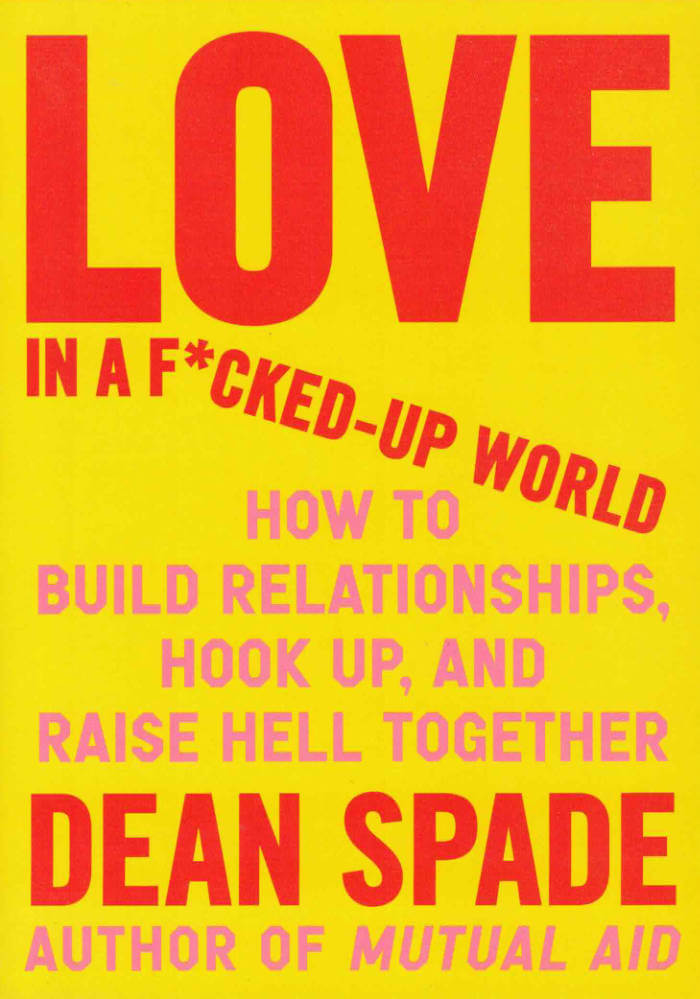
Love in a F*cked-Up World
Around the globe, people are faced with a spiraling succession of crises, from the pandemic and climate change-induced disasters to the ongoing horrors of mass incarceration, racist policing, endemic gender violence, and severe wealth inequality. Many of us feel mobilized to organize and collectively combat these issues on both a personal and political level, often dedicating our lives to the forwarding of progressive ideas and the daunting goal of trying to bend the world toward justice.
But even those of us who long for change seem to have trouble when it comes to interpersonal relationships. Too often we think of our political values as outward-facing positions again dominant systems of power. Rarely, if ever, do we pursue the same kind of justice close to home, in our personal connections. Many activist projects and resistance groups fall apart because people treat each other poorly, trying desperately to live out the cultural myths about dating and relationships that we are fed from an early age.
How do we divest from the idea that one romantic partner will be the solution to all our problems? How do we separate our expectations of love from the troubling dynamics left to us by our parents? How do we bring our best thinking about freedom and justice into step with our desires for healing and connection?
Lifelong activist and educator Dean Spade dares us to decide that our interpersonal actions are not separate from our politics of liberation and resistance. Love in a F*cked-Up World is a resounding call to action and a practical manifesto for how to combat cultural scripts and take our relationships into our own hands, preparing us for the work of changing the world.
![Cover of [...]: Poems](https://rile.space/storage/3222/01JRFE9N8ZCVXTMHJAS60D283M.jpg)
[...]: Poems
From one of our most acclaimed contemporary writers, an urgent and essential collection of poems illuminating the visionary presence of Palestinians.
Fady Joudah’s powerful sixth collection of poems opens with, “I am unfinished business,” articulating the ongoing pathos of the Palestinian people. A rendering of Joudah’s survivance, [...] speaks to Palestine’s daily and historic erasure and insists on presence inside and outside the ancestral land.
Responding to the unspeakable in real time, Joudah offers multiple ways of seeing the world through a Palestinian lens—a world filled with ordinary desires, no matter how grand or tragic the details may be—and asks their reader to be changed by them. The sequences are meditations on a the past returns as the future is foretold. But “Repetition won’t guarantee wisdom,” Joudah writes, demanding that we resuscitate language “before [our] wisdom is an echo.” These poems of urgency and care sing powerfully through a combination of intimate clarity and great dilations of scale, sending the reader on heartrending spins through echelons of time. […] is a wonder. Joudah reminds us “Wonder belongs to all.”

Still Black, Still Strong
Dhoruba Bin Wahad, Assata Shakur and 1 more
An essential document of the Black Panther Party written by three leading thinkers and party activists who were jailed following the FBI’S 1969 mandate to destroy the organization “by any means possible.”
Still Black, Still Strong is partly based upon the 1989 videotape Framing The Panthers by producers Chris Bratton and Annie Goldson. It recounts the stories of Dhoruba Bin Wahad, Mumia Abu-Jamal and Assata Shakur, all of whom were arrested and jailed during the COINTELPRO probe of the Black Panther Party.
Dhoruba Bin Wahad, who organized chapters of the Black Panther Party in New York and along the Estern Seaboard and worked with tenants in Harlem and on drug rehabilitation in the Bronx, was accused of murdering two officers while still in his teens and imprisoned for 19 years. He always maintained his innocence and won his freedom by forcing the FBI to release thousands of classified documents proving that he had been framed. The justice department eventually rescinded Bin Wahad’s conviction and he was released in 1990, seven months after the documentary premiered.
Mumia Abu-Jamal, a journalist who headed the Black Panther free breakfast program for inner-city school children in Philadelphia, was also accused of the murder of an officer and sent on death-row, where he still is today.
Assata Shakur was a college educated social worker in her twenties when she was accused of shooting a cop, then arrested and tortured and denied medical treatment. Her interview was conducted in Cuba where she has been exiled since her escape from a New Jersey women’s prison in 1975.
Bin Wahad, Shakur and Abu-Jamal offer a little-known history and an incisive analysis of the Black Panthers’ original goals, which the U.S. Government has tried to distort and suppress. As one confidential, 1969, memo to J. Edgar Hoover put it, “The Negro youth and moderates must be made to understand that if they succumb to revolutionary teaching, they will be dead revolutionaries.”
Edited by Jim Fletcher, Tanaquil Jones and Sylvère Lotringer

hello, world?
Abandoned by their Dutch partner after giving up their home and their job to follow him to the Netherlands, humanities scholar Seasonal finds themself single in a strange place for the first time in a decade.
Dipping into the rabbit hole of digital eroticism, Seasonal soon meets László, a male sub who volleys back their cerebral sexts and is seeking a dominant guide. His dating-app profile—a photo of Foucault and the ingenuous greeting “Hello, World?”—thinly veils his desire to be annihilated. It's a desire that Seasonal senses they can fulfill. But to do this means crossing the frightening gap between their desires and capacities.
Seasonal and László embark on an experiment in remaking intimacy outside the Republic of Gender. But as it continues, the two realize they are staging separate confrontations with domination: Seasonal finds they must confront their own relation to the violence and anger that marked their upbringing in working-class, small-town Australia, while László stages his own confrontation with his decision to leave Viktor Orbán’s Hungary. As they attempt to improvise a theater of domination that opens up possibilities of reciprocity, the energies of their sexuality stalk this collaboration, threatening to give them exactly what they bargained or begged for.
A feminist paean to perversity in the tradition of Pauline Réage’s Story of O and Anaïs Nin's Delta of Venus, Anna Poletti's hello, world? dares to fully inhabit female power, and to fully face the violence, beauty, and uncharted territories of human sexuality.

Airless Spaces
Shulamith Firestone was twenty-five years old when she published The Dialectic of Sex, her classic and groundbreaking manifesto of radical feminism, in 1970. Disillusioned and burned out by the fragmented infighting within the New York City radical feminist groups she’d helped to found, when her book hit the bestseller lists, Firestone decided against pursuing a career as a “professional feminist.” Instead, she returned to making visual art, the profession that she’d trained for. She wouldn’t publish anything again until Airless Spaces, in 1998.
Long before her first hospitalization for paranoid schizophrenia in 1987, Firestone had fallen off the grid and into precarity and poverty. For the next decade, she would move in and out of public psychiatric wards and institutions. Conceived as a series of vignettes about institutions and identity, Airless Spaces is a subtle and deeply literary work. Embedded as a participant-observer, Firestone moves beyond the spectacular and frightening surfaces of institutional life to record individual lives and acts of cruelty and kindness. The existence that she depicts is a microcosm of the world beyond.
After they raised her dose to 42 mg. of Trilafon, Lucy very nearly fainted. She felt a rush of bad sensation comparable to her mental telepathy when her grandmother died. ... But there was a good aspect to fainting too. As she was about to lose consciousness, she felt an overwhelming relief. The black velvety edges of the swoon. If only she could faint all the way, black out, and never wake up again ...
Introduction by Chris Kraus
Afterword by Susan Faludi

Discontent Issue 5
Reportage, new writing, photography and art from Palestine and Lebanon.
Contributors include Adam Rouhana, Ahmad Alaqra, Alaa Mansour, Areej Mahmoud, Elissa Sophia Assaf, Farrah Berrou, Hala Alyan, Lara Sheehi, Mariam Barghouti, Myriam Boulos, Nada Homsi, Nader Bahsoun, Noa Avishag Schnall, Wahaj Bani Moufleh, Yasmin Huleileh, and Yazan Al-Saadi.

We Don’t Live Here Anymore
A fragmented reflection on movement, absence, and the unraveling of identity within the shifting landscapes of departure and return. Tarren Johnson explores the tension between private longing and public expression, where moments of love and vulnerability emerge in transient encounters.
Tarren Johnson grew up in North County San Diego, where she began dancing and writings a child. She continued her studies at CalArts in Los Angeles before moving to Europe, where she built a decade-long career in the performing arts. Her debut book of poetry, We Don’t Live Here Anymore, also serves as the foundation for the stage work of the same title.
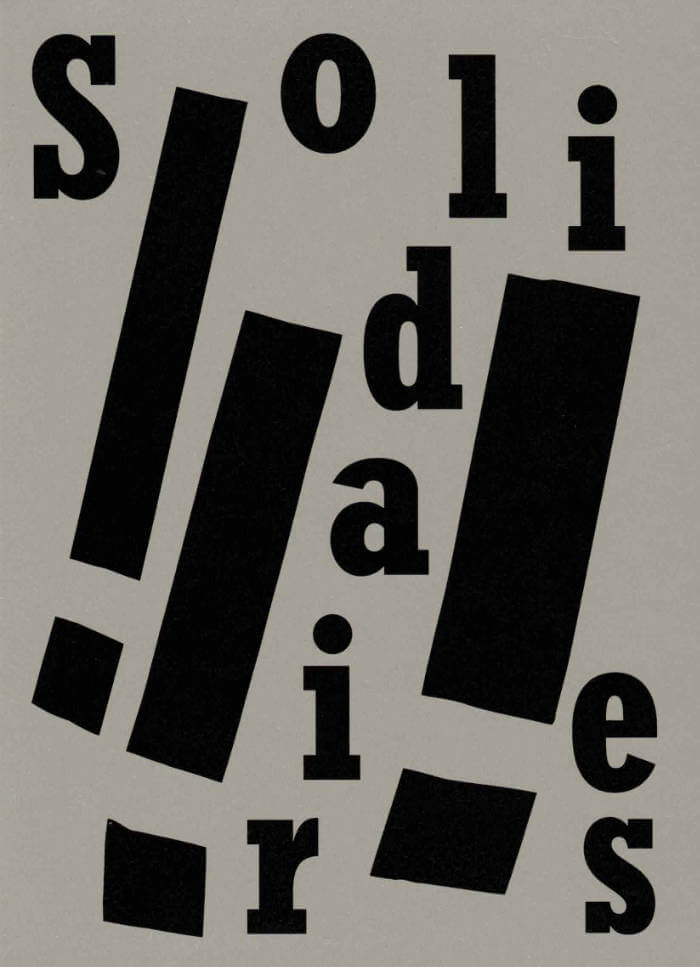
Solidaires!!!
Solidaires est un syndicat de lutte et de transformation sociale qui défend les travailleuses et travailleurs de France.
Cet ouvrage réunit une sélection de plus de 70 visuels créés par la graphiste Anaïs Enjalbert et des militant·e·s pour l'Union syndicale Solidaires.
Ce livre est une archive sélective de visuels dont les slogans accompagnent des valeurs et des pratiques émancipatrices allant du féminisme à l’antiracisme, de l’internationalisme à l’anti fascisme, de la lutte contre les lgbtphobies à celle contre le validisme. Ils soutiennent la lutte contre le capitalisme et pour les services publics.
Format 14 x 19,5 cm
Conception graphique: Magali Brueder

Sarahland
Sarahland est un ouvrage de fiction américain contemporain qui se découpe en dix nouvelles, toutes reliées par les personnages de Sarahs et leurs parcours initiatiques à la fin de l’adolescence. Sam Cohen, autrice queer et juive, déploie un univers drôle et piquant autour des notions d’identité, de transition, de transformation, d’émancipation et d’apprentissage. Au fil d’histoires inventives, l’autrice explore la manière dont les narratifs qui nous sont assignés, les récits traditionnels, les identités qui nous pré-existent, sont dépassables. Elle construit alors avec ses personnages — presque toutes prénommées Sarah — de nouvelles histoires pour leurs passés ou leurs futurs, de nouvelles façon d’aimer la terre et ceux qui la peuplent, de nouvelles possibilités de vie en soi. Dans le refus pour chaque Sarah d’adhérer à un récit unique et uniformisant, l’autrice propose un lieu potentiellement meilleur pour nous toustes, un espace narratif qui n’exige aucune fixation de soi, aucune injonction consumériste, aucun compromis corporel: un lieu appelé Sarahland.
Née à Detroit aux États-unis, Sam Cohen vit et travaille actuellement à Los Angeles. Elle est une autrice de fiction dont les romans explorent des thèmes à l’intersection du féminisme, des études queers, et des pensées juives. Après avoir publié dans différentes anthologies et revues littéraires (Queer Flora, Fauna, and Funga, Weird Sister Collection, etc.), elle publie en 2021 Sarahland, un recueil de nouvelles. Elle enseigne l’écriture à l’université en tant que professeur d’écriture créative. Elle a été nommée et à gagné à de nombreux prix littéraires, notamment le ALMA Award (Best Jewish Story Collection of 2021), le Jewish Women’s Archive Book List, le Golden Poppy Award in Fiction (finaliste) ou encore le Chautauqua Janus Prize. Elle est en cours d’écriture de son prochain livre.